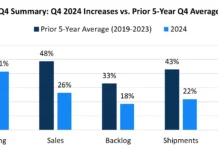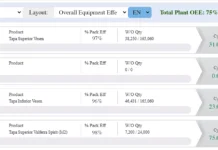by Jeff Mengel
When it comes to running your business, how do you gauge conditions? Do you stick your finger out the window – flying blind – or, like a pilot, do you rely on the instruments available to you to ensure your business maintains a consistent altitude and direction?
When it comes to quoting – one of the most significant decisions businesses make – many organizations fly blind, making decisions with limited objective feedback. We recently conducted a study on press costs and were surprised by the wide variation of presumed costs. Many companies havent updated the cost rates of their injection molding machines for several years, while some have never calculated the cost rates of their presses. Does it matter? Generally, yes. A company is prone to under-valuing certain activities and over-valuing others, particularly if they offer a wide variation of resins, part complexity, and press sizes. The problem is that customers reward you for under valuing activities but ignore your attempts to place a higher value than warranted.
We regularly hear that the cost assignment is nice but not necessary – that the market determines the price, not the cost. While this is true for any specific part, it doesnt help you manage a portfolio of parts. From defining your cost drivers and profit improvement to filtering opportunities and portfolio management, there are a number of instruments upon which companies can rely to navigate a soft landing.
Define Your Cost Drivers
Not all parts/customers consume the same resources, which can vary from tool maintenance, quality, and engineering to set-up frequency, material management, and scrap. Yet we rarely see these resources in the quoting process. Each of these resources could have its own cost buckets with assigned cost drivers to be considered in the quote process. New volume tends to increase the costs of these resources – they become somewhat variable. In contrast, the costs of occupancy, facility and machine maintenance, utility costs, and replacement cost depreciation that are assigned to the presses are fixed. Yet, most quoting models have only direct costs and press overhead rates, with the presumption that higher volumes will increase profitability by diluting the fixed overhead rates. (In fact, for a variety of reasons, larger companies tend to have lower gross profit percentage).
Profit Improvements
Its not enough to know your costs; you need to identify where theres potential for profitability improvements. This is where it is helpful to dissect your quote losses. Why did you lose the quote? To whom? Do you have competitor intelligence to understand their strengths, hunger (open capacity), and customer orientation? Do the customers cost models highlight areas of concern? By breaking down your costs into smaller cost categories, you can develop realistic cost expectations and tactics for improved profitability. Your competitors are becoming more productive are you improving faster than they are?
Filtering
Your profitability soars when your sales effort and strengths are aligned. Weve designed customer/part filters for our clients to use which help grade their new quoting opportunities. Customers/parts that receive high grades with the filter are more aggressively pursued. Conversely, lower grades are priced higher or ignored altogether. Struggling companies tend to accept any customer even poor ones. By using a filter, companies tend to be more discriminating with customer selection and profits are more likely to follow.
Portfolio Management
We recognize that all of a customers parts should be managed as a portfolio, rather than as individual parts. Unprofitable customers need to be identified and aggressively addressed. Particularly when material costs are rising, its important to have a plan outlining how aggressive youll be in pursing price adjustments. The loss of an unprofitable customer can improve profitability. However, by being aggressive, perhaps you can change the unprofitable customer into a profitable one and increase profits even further. Clients that have selectively been aggressive and received concessions from the customer often are distressed that they didnt act sooner.
Learning the Hard Way
One of our clients was having a good first six months. The company had grown annual sales to $23 million with $4 million of new work. Then production volumes of existing product slowed, and profits plummeted. The client blamed the volume reduction; however, by creating an activity-based costing (ABC) model, we were able to identify that the new work was costing them money. Big money!
The ABC model highlighted the impact of asset utilization, quality costs, engineering/tooling resources required, and the direct costs of the part. Our client concluded that retaining the current new work would ultimately lead them to bankruptcy. Unfortunately, the customer with the $4 million in new work also had an additional $5 million of existing work. Returning the new work had the potential consequence of putting the existing work at risk. Again, using the ABC model, we determined that the client would still be better off losing all $9 million of work than retaining the $4 million in new work. Armed with this objective feedback, the client was able to restructure operations, negotiate aggressively with the customer, and live another day. Eventually, the client gained by selling its operations as a profitable, but much smaller, business. They learned a hard lesson by flying blind, but found their way back through the value of good instruments to guide business decisions.
Stop Flying Blind
Thriving companies dont fly blind in any weather, let alone in the stormy conditions afflicting the plastics industry. Develop the instruments youll need to manage your business, from costing and profit improvements to filtering and portfolio management.
Jeff Mengel is a partner at Plante & Moran and leads the firms Plastics Industry Team. Mengel is a CPA with over 28 years of experience and has been studying the industry through benchmarking studies for over 12 years. Each fall, Mengel presents the North American Plastics Industry Study at the MAPP Benchmarking Conference. For more information contact Jeff Mengel at (312) 602-3515 or jeff.mengel@plantemoran.com.




